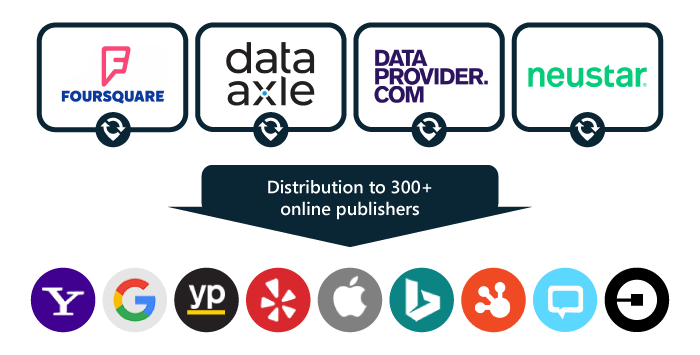
The major data aggregators in the local search ecosystem are:
- Data Axle (Infogroup)
- Neustar-Localeze (TransUnion)
- Foursquare
- Dataprovider.com
Over time, 100's of sources will reference these aggregators to collect business data and create accurate listings based on your submitted information. This includes search engines, navigation systems, voice search, mobile apps, and even offline sources like telephone books and government records.
When multiple sources have consistent business data, two outcomes occur:
- Search engine crawlers, like Google’s WebCrawler, finds the same information in multiple places and adds more confidence to their business data.
- Good backlinks are created with more referring sources to the business’ website creating better SEO.
What is a data aggregator?
Data aggregators gather consumer and business data and provide it to hundreds of listing directories, review sites, search engines, and more. They also power sophisticated modern applications such as Apple’s Siri and personal navigation systems.
How often can I make changes to my business profile?
You can update your business profile as much as you want while your Listing Sync subscription is active. There’s no limit on the number of changes you can make.
How often are listings sent to the data aggregators?
When a listing is created or modified in our system, the information is sent within 24 hours. The data aggregators receive this data and provide us with confirmation within 6-8 weeks.
We also resubmit your listing data once every week to ensure that aggregators always have the most accurate version of your listing.
Keeping data fresh, accurate and robust is incredibly important for local SEO.
What if a business has duplicate listings—how does Listing Sync Premium take care of those?
We submit the correct listing to the data aggregators, and the aggregators have their own process to eliminate duplicate listings.
How long does Listing Sync Premium (Listing Distribution) take?
As soon as you enter your business information, we push it to the data aggregators. It can take 6-8 weeks for them to receive the information and ensure it is correct in their own databases. It is then up to the sites and sources to update their information from the data aggregators. They each query them at various intervals—some seek out the information weekly, monthly, etc. Therefore, the timeline for when a source picks up that information will vary greatly depending on their process for updating their data.
Why is Listing Sync Premium a monthly subscription?
Listing Distribution (data aggregator submission) is a continual process that maintains and builds your web presence over time. Once the data aggregators have your correct business information, the rate at which sites reference this information varies. To ensure the widest span of information and amount of listings created, Listing Sync Premium needs to be activated for an extended period of time.
Even if your business information is correct, listings can be eroded over time by user-generated content and other incorrect data. As long as your subscription is active, Listing Sync Premium refreshes your information with the data aggregators every week. Without this, there is a risk of allowing the current public data to change all of the value already established.
Where do listings come from, anyway?
Online directories get business information from a huge number of sources, including:
- Business owners enter their own information
- Government sources
- User-generated content (UGC)
- Google sources (Maps, Google Business Profiles, etc.)
- Data aggregators
However, the most importantly weighted information in the U.S. comes from the major data aggregators.